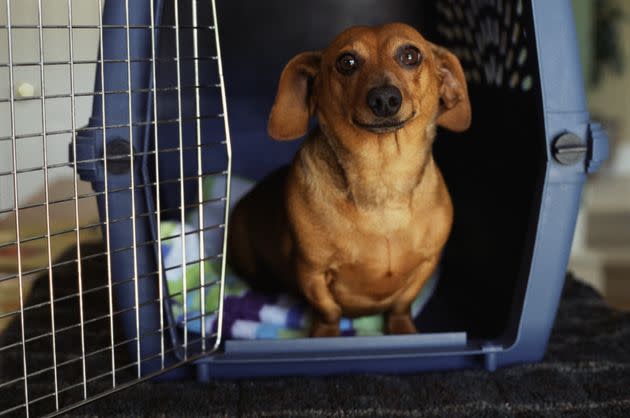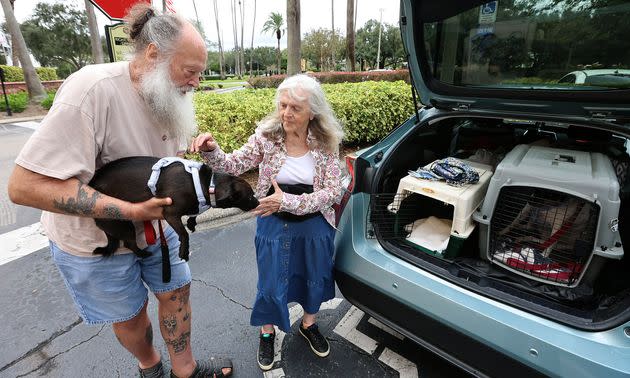Evacuating Or Sheltering With Your Pet During A Hurricane? Follow These Tips To Keep Them Calm.

If you are one of the millions of Floridians currently under a hurricane or tropical storm warning, then you might also be evacuating or hunkering down with your pet. That’s because wherever you are going for the storm, your pet should be right there with you.
“If you evacuate your home, DO NOT LEAVE YOUR PETS OR ANIMALS BEHIND. It is unlikely for pets or larger animals to survive on their own,” warns Florida’s Division of Emergency Management on its website. “If by some chance they do, you may not be able to find them when you return.”
Don’t be surprised if your pet is also acting strangely right now. Animals react differently under stress, and they can definitely feel your distress during a natural disaster. Even the most well-trained animal may bolt or bite if they are in “a fight-or-flight response,” said Dr. Debra Zoran, the director of the Texas A&M Veterinary Emergency Team that was deployed to North Carolina after Hurricane Helene.
“Everybody says, ‘Oh, the dog won’t run off.’ The number of times I’ve been in disasters when people came looking for the rescue shelter to claim the dog because he ran off, because he got scared,” Zoran said, which is why her recommendation is to keep a dog on a leash or have the leash within reach during a hurricane.
Beyond keeping your pet securely contained inside and creating an emergency supply kit for them, there are several tips that can improve your pet’s well-being during a hurricane. HuffPost asked veterinarians for their advice on keeping your pet as calm as possible in these trying times. Here are their answers to commonly asked pet owner questions during hurricanes:
How can I keep my pet calm on a long car ride while evacuating?
Hurricane evacuation is causing bumper-to-bumper traffic on highways, and you might be in for a long, nerve-wracking drive. But it is possible to make this experience less stressful on your pet passengers.
“Make the car ride more comfortable by keeping your pet in a secure,
well-ventilated crate or seatbelt harness,” said Dr. Terry Clekis, disaster preparedness committee chair for the Florida Veterinary Medical Association.
It’s safer for you and your pet if they are not loose in the car. “When we travel in the car, we have them crated, or at least in a seatbelt, because they can become projectiles if there’s an accident,” said Dr. Larry Garcia, medical director for the University of Florida Veterinary Treatment Services.
Bring your pet’s essentials like food, water, a portable bowl, medications, waste bags, or a litter box ― but also consider toys. Try giving them an interactive toy or a lick pad with peanut butter, so your pet is distracted from the long drive, Clekis suggested. He noted that some pets respond well to calming music or white noise.
And if you can, take rest stop breaks every two to three hours so that you and your pet can stretch and have a bathroom break, Clekis added.
Even if your six-hour drive is clearly making your pet unhappy, no matter what you are doing to distract them, the good news is that they are not expected to stay that way, Clekis said.
“Dogs are very forgiving. They don’t hold grudges,” Clekis said. “Most well-adjusted animals, they might be stressed during the event, but it’s not going to be a long-term change of life for them.”

How can I keep my pet calm while we are in a shelter?
Variety is not the spice of life for pets who are away from their homes. “The more structured life is, the happier they tend to be,” Garcia said.
It helps to establish a new routine if you are displaced in a shelter, Clekis said: “If you’re there for a few days, take them for a walk at the same time, feed them at the same time, throw the ball at the same time.”
Using a designated secure space like a crate will also help. “If your pet is already crate-trained, their crate can act as a safe, familiar den that can help reduce stress,” Clekis said.
But if your pet is not crate-trained, there are other ways to help keep them calm. If your pet has a designated spot on your couch at home, bring a blanket or a cover from that couch to the shelter, Garcia suggested.
“In most cases you’re going to have at least a cot or something like that, and then I would recommend them kind of sitting on the cot with the dog as they would at home” with the blanket, he said.
In general, bring clothing or blankets pets love that smell like home, because this can comfort them in an unfamiliar setting like a shelter.
With cats, covering their enclosure with a blanket helps them avoid looking at other animals that make them nervous, Zoran recommended.
It also helps to give cats a space to hide, which can be as simple as a cardboard box in their carrier. “If they’re scared to death, they’ll be in that box, and that will give them a safe space...a spot that’s something they can sleep on,” Zoran said. She noted that cats prefer food and water closer to their bed area and far away from their litter area.
Your simple presence can also make a difference in your pet’s mood. “Staying close to your pet, speaking in soothing tones, and giving attention can help them feel more secure,” Clekis said.
How can I keep my pets calm in my home during a hurricane?
Animals are sensitive to storms and may be frightened by the banging noises and howling winds outside. Dogs in particular notice changes in atmospheric pressure, Clekis said.
Keeping your pet in a quiet, enclosed room or crate away from the views and sounds of the storm can help, Clekis said. Alternatively, try blocking out the thundering rain noises with music or a white machine. Clekis said playing music louder in the house and keeping his dog away from windows has helped his own dog during fireworks.
If you have a cat, cover them in their carrier, because cats in particular often feel more comfortable in enclosed spaces when they are stressed. “Covering your cat’s crate with a breathable cloth can help reduce visual stimuli and create a den-like feeling, which can lower stress,” Clekis said.
Bring your pet’s favorite toys and cushion to keep them company, too. “If they feel that in a safe, comfortable environment, surrounded by stuff that they are used to, their blankets and their smells ... something that feels like home, I think those are all comforting to them,” Clekis said.
I am taking care of my neighbor’s pet. How should I shelter them with my own pet?
Under normal circumstances, you can introduce two unfamiliar pets slowly over time. But you don’t have that time in a hurricane that is bulldozing towards you.
“If you’re housing your pet with an unfamiliar neighbor’s pet, try to keep them separated at first, ideally in different rooms or crates,” Clekis said. “If they need to share space, supervise their interactions closely to prevent stress or aggression.” He also said to keep high-value resources like toys and food in separate spaces to avoid competition between pets.
Ideally, each pet should have their own carrier or room, but if you all need to shelter in one space, make a literal barrier out of what you have that can block the view of the other pet, Zoran recommended.
She gave the cautionary example of an unfamiliar dog sheltering with your cat. “The dog may just be curious, but he will scare the bejesus out of the cat if they aren’t used to living together,” she said. “And then you have cats that are not eating, or cats that get urinary issues from stress.”
Should I give pets anti-anxiety medication? What about calming sprays?
Veterinarians say over-the-counter calming pheromone sprays such as Adaptil for dogs or Feliway for cats may help relax your pet when they are feeling nervous. “Sometimes that helps,” Zoran said.
But Clekis recommends consulting your vet before using actual anti-anxiety medication like Trazodone for dogs or Gabapentin for cats.
“While tranquilizing your pet can help reduce panic, overly sedating them
could dull their senses and slow their reaction times in case they need to move quickly or respond to changes in the environment,” Clekis said.
If this would be a pet’s first time using an anti-anxiety medication, do not use a natural disaster as your test.
“If your pet has never taken one in its life, stay as far away from it as humanly possible,” Zoran said. “Many of them can have unintended consequences, and now you’re going away from the home and going away from your vet.”
Garcia said you want to have your pet’s medical records on a thumb drive or on paper in a plastic bag. This way, if your veterinarian is unavailable after the hurricane, a different veterinarian “can take those medical records, potentially contribute to medications.“
Garcia said with a heads up, your vet can also give you a longer refill on medications for a month or two in these kinds of emergencies. But a day before a hurricane is likely too late to consult your vet in time to get medication, Clekis said: “You’re limited in what you can do at this point.”
In these cases, it helps to at least stop your stress from becoming contagious. Pets pick up on your emotions and respond accordingly. This is a good reminder, no matter where you are sheltering during Hurricane Milton. “If you maintain a certain semblance of calmness, it will project onto your pets, and that’s one of the best things that you can do,” Clekis said.

